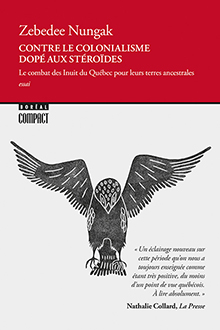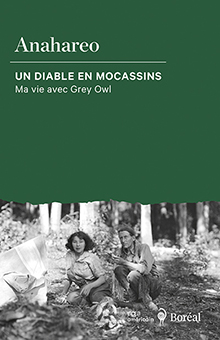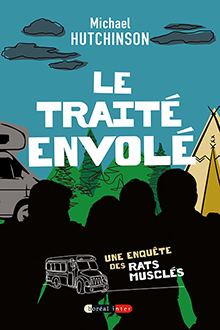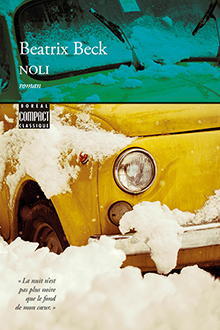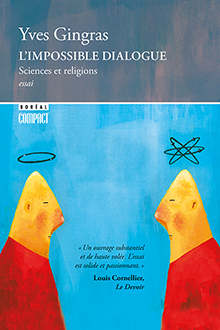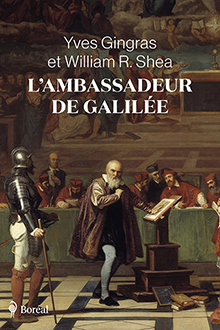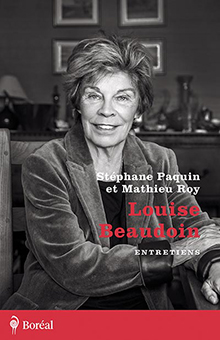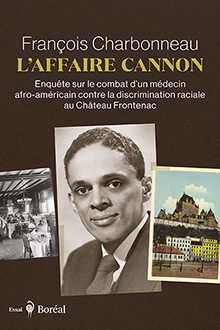Publiés récemment
Proses choisies
Saint-Denys Garneau
17.95$ / 14.00€
De son vivant, de Saint-Denys Garneau n’a publié qu’un petit nombre de textes en prose – vingt-six en tout si l’on compte les écrits de jeunesse –, surtout des critiques d’art et des comptes rendus. Son œuvre en prose est pourtant considérable si l’on inclut son journal et sa riche correspondance, dont sont tirés la presque totalité des textes choisis dans cette anthologie.
Écrits entre 1929 et 1938, ces textes permettent de suivre l’émouvant récit de soi que Garneau ne cesse de construire alors qu’il n’est encore qu’un jeune adulte. On y découvre un prosateur remarquablement inventif, tantôt drôle, tantôt grave, toujours passionnant, qui fait preuve d’une précision quasi immersive dans ses descriptions de paysage, d’une vivacité souvent comique dans certains récits, et de vues d’une grande originalité en matière artistique.
suite…
Leçons de démocratie
Daniel D. Jacques
24.95$ / 20.00€
La démocratie est en danger. Pas une journée ne passe sans que les grands titres des actualités nous le rappellent. Mais qu’est-ce au juste que cette démocratie dont on nous dit qu’il faut la chérir à tout prix ?
Daniel D. Jacques nous invite dans ces pages à saisir la situation politique qui est désormais la nôtre et à découvrir ce que la philosophie peut offrir par temps trouble. Ce livre s’adresse aux amis de la démocratie et veut leur permettre de distinguer leurs véritables adversaires.
suite…
Le Junk
Arthur Friso
27.95$ / 22.00€
Deux frères et une sœur devenus adultes répondent, à leur corps défendant, à l’appel du père expatrié : une semaine dans la chaleur brûlante de Hong Kong, dans l’exiguïté d’un bateau-maison, un junk, amarré dans la marina d’Aberdeen. À bord, ils n’auront nulle part où fuir ni la logorrhée du père, ni le dysfonctionnement de leurs liens familiaux. Les eaux de l’archipel, les rues bondées de Kowloon, l’agitation perpétuelle de Central ou les plages de l’île de Cheung Chau seront le théâtre d’une comédie dramatique ordinaire où les non-dits tiennent le rôle principal.
suite…
Puis je serai seul
Gilles Archambault
21.95$ / 18.00€
Ce recueil, qui conjugue récits personnels et nouvelles, porte à son paroxysme l’art de la suggestion que l’auteur polit depuis de nombreuses années. En quelques paragraphes à peine, chacun de ces trente-cinq textes nous offre des concentrés d’existences que bien des romans seraient incapables de déployer. C’est peut-être là le plus grand talent de Gilles Archambault : saisir, par son propre regard ou celui emprunté aux personnages qu’il invente, ces petites et grandes vérités qui surgissent inopinément dans notre quotidien pour sitôt disparaître en laissant derrière elles l’impression diffuse d’une leçon de vie.
suite…
Ce petit grand monde
Lakis Proguidis
27.95$ / 22.00€
Voici un recueil d’essais littéraires comme on en rencontre peu: à partir d’exemples de romans pris dans ce qu’on appelle les «petites littératures», Lakis Proguidis propose un voyage unique dans les profondeurs de l’imaginaire humain. Il commence avec des œuvres récentes, venues du Liban, d’Islande, du Portugal, du Japon, de Grèce, de Pologne ou du Mexique, puis termine son exploration avec des romans issus du centre de l’Europe, du Québec (Jacques Ferron, Gabrielle Roy) ou d’ailleurs dans ce «petit grand monde». Une critique impitoyable de notre époque mondialisée, du triomphe de l’économie libérale, et une défense du roman cosmopolite en ce qu’il a de plus libre, de plus rieur, de plus beau, de plus lucide et de plus émouvant.
suite…
Femmes reporters du Québec (1890-1945)
Charlotte Biron
21.95$ / 18.00€
Jusqu’en 1945, l’histoire du journalisme s’est généralementconstruite autour de figures masculines, reléguant pour l’essentiel lacontribution des femmes au Québec aux pages féminines des journaux. Pourtant,très tôt, des femmes journalistes vont sur le terrain. Parus entre 1890 et1945, les textes réunis dans cette anthologie mettent en lumière l’apport dequatorze d’entre elles à l’histoire du reportage au Québec, mais aussi lesliens qui existent entre leur parcours. À leur manière, toutes transgressent unrôle typiquement féminin. Elles inventent ainsi de nouvelles manières d’êtrereporter et contribuent à transformer durablement les pratiques d’écriturejournalistiques.
suite…
Les Voix fugitives
Kai Thomas
32.95$
En 1859, dans un village du sud-ouest de l’Ontario fondé par des réfugiés noirs qui ont fui les États-Unis par le chemin clandestin du Underground Railroad, une vieille femme nommée Cash abat un chasseur d’esclaves américain. On dépêche Lensinda Martin, journaliste pour un journal abolitionniste, afin de recueillir son témoignage avant sa condamnation. Mais Cash refuse de se livrer et propose plutôt à Lensinda un marché: un récit contre un récit. S’ensuit un échange de mots extraordinaire qui révèle l’histoire entremêlée du Canada et des États-Unis, celle des peuples autochtones, des personnes noires réduites à l’état d’esclaves et de leurs descendants des deux côtés de la frontière.
suite…
Parfum de craquias
Michel Désautels
23.95$ / 19.00€
Michel Désautels nous invite à arpenter le quartier de son enfance, situé quelque part à l’est de la rue d’Iberville et au nord de la rue Saint-Zotique. Il nous présente ses souvenirs baignés d’une lumineuse nostalgie qui refuse d’idéaliser le passé, mais qui s’incruste dans notre mémoire, tout comme les capitules de bardane – qu’on appelle aussi craquia – s’accrochent aux vêtements, au pelage des animaux, aux cheveux de notre petite sœur. Des jeux au parc Bélair aux matchs de hockey disputés dans la ruelle, nous le suivons avec délectation sur les chemins de l’enfance, à la découverte d’un Montréal cosmopolite et bigarré, plein de vie, que l’on reconnaît sans peine.
suite…
Un don du ciel
Eveline Payette
20.95$ / 17.00€
Ruby refuse de grandir. Ou plutôt, elle refuse de devenir une personne ordinaire. Elle observe avec fascination les trajectoires des René Simard, Simone Biles, Judy Garland et Nadia Comaneci de ce monde et se dit que c’est ça, la solution: être découverte pour finalement rejoindre ses idoles au firmament des enfants stars! Le jour de ses douze ans, elle doit se rendre à l’évidence: son rêve commence à lui filer entre les doigts. Ruby décide qu’avant son prochain anniversaire, son destin aura changé. Elle ne sait pas encore comment, mais elle échappera à la vie ordinaire qui a tant déçu sa mère et qui a poussé son père à se détourner de sa famille. Elle aura une vie extraordinaire.
suite…
Cuvée mortelle
Olivier Challet
32.95$ / 26.00€
Dans cette histoire palpitante qui fleure bon le terroir, les crus millésimés et les petits plats mitonnés, Olivier Challet nous entraîne sur les grandes routes des vins, à une époque où l’on s’orientait encore au flair ou à l’aide d’une carte. De la côte de Beaune au cœur du Chianti, en passant par Sonoma et Monterey, les amateurs de bonnes bouteilles et, surtout, de grands romans policiers suivront avec bonheur les recherches d’un trio d’enquêteurs aussi attachants que complémentaires qui n’hésiteront pas à mettre leur vie en danger pour que les vignes retrouvent leur calme légendaire.
suite…
Des nouvelles de Martha
Marie Laberge
19.95$
En 2008, Marie Laberge annonçait la naissance d’un projet tout aussi inouï qu’audacieux. À partir de janvier 2009, les personnes qui se seraient abonnées recevraient tous les quinze jours, par la poste, des lettres qui formeraient avec le temps un roman épistolaire complet. Chacune de ces lettres serait signée par une dénommée Martha et serait personnellement adressée à cette lectrice ou à ce lecteur. Ce sont 100 000 personnes qui ont ainsi reçu, pendant trois ans, la correspondance de cette femme énergique de soixante-deux ans qui témoigne des moments cruciaux qui traversent sa vie et celle des siens. Ce succès sans précédent est ici réuni pour la première fois sous forme de livre.
suite…
Nords
Monique Durand
29.95$
De la mythique route 389, qui relie la Côte-Nord du Québec à la mer du Labrador, jusqu’à la Sibérie orientale, en passant par les îles de l’Atlantique Nord et les alpages de la Haute-Savoie, Monique Durand, grande voyageuse, a traqué le Nord comme on poursuit une idée. Dans une prose somptueusement vivante où souffle la poésie de la liberté, elle nous offre, en un vaste panorama, les multiples déclinaisons de ce Nord mythique qui recouvre tous les Nords de nos vies, ceux que nous habitons comme ceux que la plupart des humains normalement constitués s’efforcent d’éviter.
suite…
Années de ferveur 1987-1995
Éric Bédard
19.95$ / 16.00€
De 1987 à 1995, c’est-à-dire de dix-sept à vingt-cinq ans, Éric Bédard s’est activement engagé en politique. D’abord inspiré par la figure de Jacques Parizeau, croisé au moment où celui-ci est élu chef du Parti québécois, cet engagement a mené Éric Bédard à la présidence du Comité national des jeunes du Parti québécois. C’est le poste qu’il occupait le 30 octobre 1995, date fatidique du deuxième référendum sur la souveraineté du Québec.
suite…
Ma bête
Michèle Ouimet
27.95$ / 22.00€
Comme tous les amoureux, ils ont leur langage secret. Elle est sa «Pitoune». Il est sa «Bête». Depuis trente ans, ils forment un couple atypique, alternant les périodes de vie commune et de vie chacun chez soi. Mais André est malade. Il cumule deux maladies dégénératives, le parkinson et l’aphasie, sur fond de dépression chronique. Un jour, la peur prend le dessus, et Michèle convainc André de se rendre aux urgences. À la frontière du roman et du récit autobiographique, Michèle Ouimet nous offre un livre bouleversant qui nous oblige à revoir nos idées reçues tant sur la maladie mentale que sur le couple. Surtout, elle raconte une grande histoire d’amour. Un amour fort, inoubliable.
suite…
Partir pour raconter
Michèle Ouimet
19.95$ / 16.00€
Pendant vingt-cinq ans, Michèle Ouimet a parcouru la planète. Du Rwanda à l’Arabie saoudite, en passant par l’Iran, le Pakistan, l’Afghanistan, la Syrie, le Mali, l’Égypte, elle a couvert les guerres, les révolutions, les désastres naturels. Elle nous donne ici le passionnant récit de sa carrière de grand reporter international, nous laissant voir les coulisses du métier. Elle, québécoise, féministe, athée, nous entraîne sous la tente de seigneurs de guerre et sur les traces de djihadistes qui refusent de la regarder parce qu’elle est une femme.
suite…
Musique d'intérieur
Jérémie McEwen
25.95$ / 21.00€
Arrivé au mitan de son existence, Jérémie McEwen a décidé de composer la playlist d’une vie traversée par la musique. S’appuyant sur les chansons qui ont façonné sa vision du monde, il retrace son itinéraire en nous entraînant dans la cour de l’école spécialisée Le Plateau, sur les scènes qu’il a arpentées avec son groupe de rap, dans les concerts et les festivals qu’il a couverts en tant que critique, dans l’univers qui l’a mené à écrire Philosophie du hip-hop. Surtout, il déconstruit l’identité qu’il s’était bâtie depuis l’adolescence, une identité longtemps nourrie par l’idéal du mâle alpha que lui renvoyaient la musique qu’il écoutait et le groupe de garçons dominants qu’il fréquentait.
suite…
Les Amandiers en fleurs
Mauricio Segura
27.95$ / 22.00€
Un romancier et essayiste montréalais, chilien d’origine, débarque à Santiago pour participer à un colloque universitaire sur Camus. Il y retrouve Laura, son amie d’enfance, sa petite sœur d’adoption, qui a grandi à Montréal à ses côtés, mais qui est rentrée au Chili à l’adolescence. Au cours d’une nuit d’errance dans un Santiago encore une fois ravagé par l’agitation sociale, ils se remémorent leur enfance. Ils s’affrontent. Tandis qu’elle cherche obsessionnellement à élucider les circonstances de la mort de sa mère, Monica, pasionaria assassinée par les militaires, il l’incite à dépasser ces conflits qui appartiennent à la génération de leurs parents.
suite…
La Gringa
Marie-Sarah Bouchard
27.95$ / 22.00€
Avec ses cheveux roux et son teint de lait, Maria ne ressemble à personne à Maracaibo. Un jour, elle découvre pourquoi: à l’été 1969, ses parents Raúl et Victoria sont venus la chercher dans un orphelinat de Montréal. Des années plus tard, quand le paradis qu’était le Venezuela de sa jeunesse se transforme en enfer, Maria décide de quitter son pays adoré pour le Canada. Une fois là-bas, résistera-t-elle à l’envie de partir à la recherche de sa mère biologique, au risque de découvrir qu’elle n’est pas telle qu’elle l’avait imaginée? S’inspirant d’une histoire vécue, Marie-Sarah Bouchard nous donne un roman prenant sur le déracinement, la filiation, les liens de sang comme ceux du cœur.
suite…
Louise et le concerto du mont Royal
Victoria Lord
19.95$ / 16.00€
Entre deux séances d’improvisation musicale, Louise et son ami Charles découvrent l’existence de Vincent Ferland, un compositeur et chef d’orchestre disparu sans laisser de traces par une nuit de l’été 1949, la veille d’un concert historique sur le mont Royal. Louise a une idée: et si elle utilisait le gramophone magique de son grand-père, celui qui permet de remonter le temps, pour élucider le mystère de la disparition de Vincent Ferland? Avec Charles à ses côtés, elle ne risque rien, croit-elle. Mais quand se retrouve perchée au sommet de la croix du mont Royal en pleine nuit, Louise se dit qu’elle aurait peut-être dû rester chez elle…
suite…
Les Rescapés de l'orage
Adeline Caute
18.95$ / 15.00€
Sophie, Adrien,Antoine et Rose devaient passer deux jours bien ordinaires à Montréal pendant queleurs parents participaient à une conférence à Ottawa. Mais voilà que leurgardien les abandonne dans la cour d’une école d’Ahuntsic… Quand un orageviolent éclate, les quatre amis doivent quitter la cour sans attendre. Or, avecle fauteuil roulant d’Adrien et les petites jambes de Rose, trouver un refugen’est pas une mince affaire. Le quatuor se lance dans une intrépide traverséede Montréal qui les mènera des ruelles de Villeray au sommet du mont Royal,durant laquelle ils devront surmonter lafaim, la soif, les inondations et, pire que tout, l’absence de réseaucellulaire!
suite…
Terre des humbles
Gérard Bouchard
34.95$ / 28.00€
Ce livre est consacré à la reconstitution des rêves et des revers d’une société neuve. Gérard Bouchard y rend compte de l’évolution d’une société régionale – le Saguenay, de 1840 à 1940 – en suivant la démarche de l’histoire sociale. Il en embrasse ainsi toutes ses dimensions: territoriale, démographique, économique, sociale, politique et culturelle (y compris la religion). Il fait également ressortir les interactions entre ces sphères de façon à obtenir une vision dynamique de l’ensemble de cette société. Le résultat est un portrait unique et précieux des ancêtres saguenéens.
suite…
Choisis-moi
Francine Noël
21.95$ / 18.00€
Francine Noël nous propose un titre des plus étonnants. Alternant nouvelles de forme classique, microrécits, listes, nouvelles interreliées, elle joue dans Choisis-moi de tous les sortilèges de l’écriture avec une fabuleuse inventivité et une totale liberté.
suite…
Tout cela m'appartient
Virginie Chaloux-Gendron
25.95$ / 21.00€
Elle a aimé un homme. Elle a aimé son corps, sa tête, son histoire. Elle a souhaité passer sa vie avec lui. Personne n’était parvenu à la toucher comme lui. Il savait répondre à ce qu’il y a de fondamental en elle, son désir de vivre et de croire en demain. Avec lui, elle a appris à rire de tout, même de la mort. Mais après une relation marquée par la violence qui a duré presque sept ans et un processus judiciaire qui s’est étiré sur plus de deux ans et demi, elle ne souhaite qu’une chose : que le temps reprenne ses droits. Virginie Chaloux-Gendron livre ici le récit de cette réappropriation.
suite…
Jean-Jacques
Sylveline Bourion
27.95$ / 22.00€
Ceci (telle la pipe de Magritte) n’est pas une biographie. Vous n’allez pas avec Jean-Jacques vous farcir l’histoire exhaustive du docte Jean-Jacques Nattiez, fameux musicologue ; vous aurez, gaillardement posé sur lui, un regard libre, non le pedigree d’un savant mais un portrait en proximité d’un individu. Sylveline Bourion, en leste élève, fait de ce maître un humain trop humain, fils, frère, écolier, collectionneur, voyageur curieux, enthousiaste des choses de l’esprit, amoureux des arpèges, professeur tout sauf cinglé, varappeur de cimes dodécaphoniques, sherpa de bizuts et de surdoués, sensible aux égards, un brin infatué et bel et bien lui, né à Amiens en 1945…
suite…
L'Enfant vieux
Stéphane Kelly
27.95$ / 22.00€
Du fait d’une natalité anémique, un important bloc de la population du Québec est engagé aujourd’hui dans la vieillesse. Ce bloc pèse culturellement, politiquement et socialement lourd sur les grandes orientations collectives. Faut-il s’étonner alors que le Québec traite maintenant ses enfants comme de vieilles personnes? Stéphane Kelly a écrit cet essai en s’appuyant sur son expérience d’enseignant et de parent. Pour comprendre cette curieuse évolution sociale, engagée depuis le début du millénaire, il fait appel au concept de société thérapeutique, amplement étudié par de nombreux sociologues contemporains, et s’attarde surtout à la question de la socialisation.
suite…
L’imagination que donnent les vraies tendresses
Robert Lalonde
23.95$ / 19.00€
Dans ce roman à la prémisse audacieuse, Lalonde revendique «l’imagination que donnent les vraies tendresses» – la formule est de Flaubert – pour engager une correspondance outre-tombe avec l’ermite de Croisset. Séparés par la mort, unis dans l’obsession des mots, les deux compères échangent des propos d’atelier, ne cessent de s’émerveiller du pouvoir de la littérature. S’ils ronchonnent de concert en exprimant leur insatisfaction face à leurs époques, Lalonde réussit quand même à étonner son «nouveau» vieil ami en décrivant certaines innovations qui caractérisent son monde à lui, notamment une façon d’aimer, inconnue au XIXe siècle, qui accorde aux deux sexes une parfaite égalité.
suite…
Rang de la Croix
Katia Gagnon
19.95$ / 16.00€
Quatre femmes, quatre époques, quatre destins tragiques. Katia Gagnon nous surprend avec un roman sombre, aux tonalités fantastiques et au suspense haletant.
suite…
Les Crépuscules de la Yellowstone
Louis Hamelin
19.95$ / 16.00€
Le portrait contrasté d'une légende de l’Amérique française et yankee, le naturaliste Jean-Jacques Audubon. Un grand roman américain où la fascination pour les aventuriers du passé côtoie le désenchantement devant les grandes surfaces commerciales. Louis Hamelin en pleine possession de ses moyens qui s’interroge sur sa vie d’homme et d’écrivain.
suite…
Montcalm, général américain
Dave Noël
21.95$ / 18.00€
En relevant les lectures erronées dont Montcalm a fait l’objet dans le passé et en retraçant son parcours américain, Dave Noël offre un portrait complet, sans complaisance, du général vaincu devant Québec. Et il nous permet de revivre la fameuse bataille selon une perspective toute nouvelle. Rédigé dans un style remarquable qui donne du souffle à une démonstration rigoureuse, il est appelé à marquer l’historiographie de la période.
suite…
Daddy Issues
Elizabeth Lemay
14.95$ / 12.00€
Une jeune femme attend son amant. Il est plus vieux qu’elle. Il est marié. Il vient la voir quand bon lui semble et la quitte ensuite. Elle n’est que la maîtresse. Pendant qu’elle l’attend, elle lit. Annie Ernaux ou Roland Barthes, Françoise Sagan ou Marguerite Duras. Mais surtout Hubert Aquin, Prochain épisode. Et la taraude cette question obsédante: comment expliquer cette propension qu’ont un peuple et certaines filles à plonger la tête la première dans un merdier? À s’abîmer dans des rêves auxquels eux-mêmes ne croient pas? Elizabeth Lemay donne un premier roman dérangeant, provocateur, qui pose une interrogation radicale sur l’amour, sa nature, sa fonction.
suite…
À feu nourri
Scott Thornley
32.95$
Dans cette cinquième enquête, Scott Thornley met en scène une série d’assassins calculateurs et arrogants qui ont la fâcheuse tendance de se succéder à la manière de poupées russes. Jamais l’inspecteur MacNeice n’aura fait face à de tels adversaires. Heureusement pour lui, certains d’entre eux découvriront à leurs dépens qu’il n’est pas si facile de faire disparaître un corps pour de bon.
suite…
Contre le colonialisme dopé aux stéroïdes
Zebedee Nungak
14.95$ / 12.00€
Pendant des décennies, les Inuit de l’Arctique québécois ont compté parmi les communautés les plus défavorisées au Canada. Il a fallu la bataille judiciaire déclenchée par l’annonce du projet de la Baie-James pour que le monde se souvienne enfin de leur existence. C’est ainsi qu’une communauté de quatre mille âmes, dispersée sur un immense territoire, n’ayant jamais connu d’institutions pour les représenter ou quelque forme d’autogouvernement, a dû, du jour au lendemain, se mobiliser et créer les structures nécessaires pour affronter un ennemi dont la taille et la puissance étaient infiniment supérieures aux siennes. C’est ce combat héroïque qui est raconté dans ce livre, avec verve, passion et une ironie souvent mordante.
suite…
Un diable en mocassins
Anahareo
29.95$
Anahareo fut la compagne d’Archibald Belaney, alias Grey Owl, sans doute le plus connu des « fautochtones » du Canada. Si ce cas d’usurpation d’identité est en grande partie racheté, aux yeux de la postérité, par l’importance capitale de l’œuvre d’environnementaliste de Belaney, on connaît moins bien Anahareo, née Gertrude Bernard, et le rôle crucial qu’elle a joué dans la conversion de ce trappeur en protecteur des espaces et des espèces sauvages. Autochtone d’ascendance mohawk, capable de « manier une hache aussi bien qu’un bâton de rouge à lèvres », comme l’écrivit Grey Owl, elle le suivit du nord de l’Ontario jusqu’aux solitudes de l’Abitibi, où, quelque part sur un lac de l’immense nord-ouest québécois, elle le persuada d’épargner et d’adopter les deux petits castors qui allaient bouleverser leur existence.
suite…
Le Traité envolé
Michael Hutchinson
19.95$ / 16.00€
Des Cris des Plaines vivant au pied des Rocheuses albertaines jusqu’aux Attikameks du Québec, ils sont nombreux à avoir fait le voyage pour assister à l’Assemblée nationale des Cris, qui se tient cette année dans la communauté de Lac-aux-Vents. L’événement est l’occasion pour les communautés de se rencontrer, de participer à des activités traditionnelles et de transmettre aux jeunes générations des savoirs immémoriaux. Sam, Otter, Atim et Chickadee sont surexcités. Or la bonne tenue de l’Assemblée est mise en péril par la disparition d’un précieux traité contenu dans un sac dépositaire de la mémoire de la nation. Il en va de leur dignité : il faut absolument retrouver le traité envolé!
suite…
Noli
Béatrix Beck
14.95$
Dans les années 1960, Béatrix Beck est invitée à donner des séminaires sur la littérature française contemporaine dans des universités québécoises. Elle découvre alors un monde qui la stupéfie, celui de la Révolution tranquille, où les cornettes des religieuses côtoient les chemises à carreaux des révolutionnaires. Au-delà du plaisir de chercher à reconnaître entre ses pages les êtres ayant inspiré les personnages (seraient-ce Jeanne Lapointe et Anne Hébert, les deux amies inséparables qui occupent une place centrale dans le roman?), Noli nous invite à un étonnant voyage dans une société dont nous n’avons peut-être pas encore mesuré la radicale originalité.
suite…
L'Impossible dialogue
Yves Gingras
19.95$
Cet ouvrage examine, dans la longue durée (du XVIIe siècle à nos jours), les luttes pour l’autonomie de la recherche scientifique face aux institutions religieuses.
suite…
L'Ambassadeur de Galilée
Yves Gingras
William R. Shea
34.95$
Établis à partir de la volumineuse et?passionnante correspondance d’un témoin privilégié de la carrière de Galilée, Francesco Niccolini, ambassadeur à Rome du grand-duc de Toscane de 1621 à 1644, ces faux mémoires projettent un éclairage original sur la vie d’un des plus grands scientifiques de tous les temps. En plus de nous faire découvrir des aspects méconnus de la carrière de Galilée, comme la mise au point de sa méthode de détermination de la longitude et les efforts qu’il a déployés pour la vendre aux grandes puissances qu’étaient l’Espagne, les Provinces unies et la France, ce livre nous rappelle, en brossant un vaste tableau d’époque, la grande contingence des événements historiques.
suite…
Louise Beaudoin. Entretiens
Stéphane Paquin
Mathieu Roy
27.95$ / 22.00€
Militante de la première heure au Parti québécois, Louise Beaudoin a été directrice de cabinet, déléguée générale du Québec à Paris, ministre des Relations internationales, ministre déléguée aux Affaires intergouvernementales canadiennes, de la Culture et des Communications, ministre responsable de l’application de la Charte de la langue française et ministre des Relations internationales et de la Francophonie. Elle a laissé sa marque dans le domaine de la culture, veillant à la défense du français et de la diversité des expressions culturelles. Dans ces fascinants entretiens, elle se remémore ses nombreux combats pour assurer au Québec la place qui lui revient parmi le concert des nations.
suite…
L'Affaire Cannon
François Charbonneau
32.95$ / 26.00€
Quand François Charbonneau ouvre son Devoir, par un matin de 2020, il découvre un texte racontant un incident qui s’est déroulé à Québec en août 1945. Un médecin new-yorkais, le Dr George D. Cannon, qui séjournait alors au Château Frontenac avec sa femme Lillian Moseley, s’est vu interdire l’accès à la salle à manger. Il n’en fallait pas plus à l’auteur pour se lancer dans une passionnante enquête. Nous passons en sa compagnie d’innombrables heures à retrouver les descendants de Cannon, à chercher une autobiographie perdue, à nous battre pour avoir accès à des archives qui dérangent. Et surtout, nous découvrons la vie et la pensée d’un homme d’exception qui mérite qu’on se souvienne de lui.
suite…
Tél: (514) 287-7401 Téléc: (514) 287-7664
Les photos des auteurs ne peuvent être reproduites sans l'autorisation des Éditions du Boréal.


































